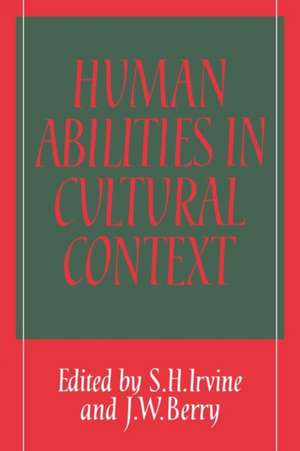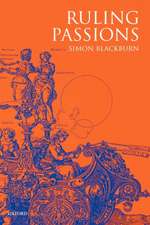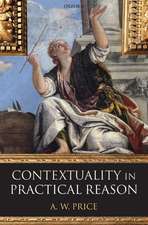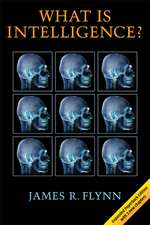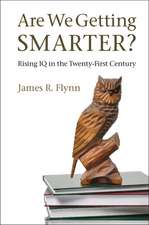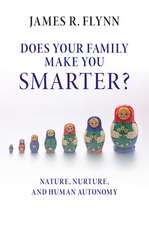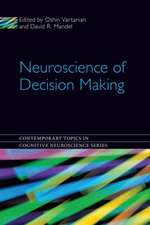Human Abilities in Cultural Context
Editat de S. H. Irvine, J. W. Berryen Limba Engleză Paperback – 19 ian 2011
| Toate formatele și edițiile | Preț | Express |
|---|---|---|
| Paperback (1) | 439.56 lei 6-8 săpt. | |
| Cambridge University Press – 19 ian 2011 | 439.56 lei 6-8 săpt. | |
| Hardback (1) | 1148.97 lei 6-8 săpt. | |
| Cambridge University Press – 29 sep 1988 | 1148.97 lei 6-8 săpt. |
Preț: 439.56 lei
Preț vechi: 493.89 lei
-11% Nou
Puncte Express: 659
Preț estimativ în valută:
84.12€ • 87.50$ • 69.45£
84.12€ • 87.50$ • 69.45£
Carte tipărită la comandă
Livrare economică 15-29 aprilie
Preluare comenzi: 021 569.72.76
Specificații
ISBN-13: 9780521142113
ISBN-10: 0521142113
Pagini: 636
Dimensiuni: 156 x 234 x 33 mm
Greutate: 0.88 kg
Editura: Cambridge University Press
Colecția Cambridge University Press
Locul publicării:New York, United States
ISBN-10: 0521142113
Pagini: 636
Dimensiuni: 156 x 234 x 33 mm
Greutate: 0.88 kg
Editura: Cambridge University Press
Colecția Cambridge University Press
Locul publicării:New York, United States
Cuprins
Preface; Acknowledgements; Part I. Human Abilities in Theoretical Cultures; Section 1. Holistic Theories: 1. The abilities of mankind: a revaluation S. H. Irvine and J. W. Berry; 2. A triatchic view of intelligence in cross-cultural perspective Robert J. Sternberg; Section 2. Biometric Fundamentalism: 3. The biological basis of intelligence H. J. Eysenck; 4. Speed of information processing and population differences Arthur R. Jensen; Section 3. Structural Psychometrics: 5. The factor model as a theoretical basis for individual differences Joseph R. Royce; 6. The meaning of item bias in ability tests Ype H. Poortinga and Henk van der Flier; Part II. Cultural Responses to Ability Measurement; Section 4. Europe and North America: 7. The British 'cultural influence' on ability testing Paul Kline; 8. Cultural influences on patterns of abilities in North America Philip Anthony Vernon, Douglas N. Jackson and Samuel Messick; 9. Human abilities in the Eastern Mediterranean Cigdem Kagitcibasi and Isik Savasir; 10. The Norwegian tests and measurements in cultural context Knut A. Hagtvet and Johan O. Undheim; Section 5. Africa, Asia, and Australia: 11. Human assessment in Australia Daphne M. Keats and John A. Keats; 12. Test performance of blacks in Southern Africa I. M. Kendall, Mary Ann Vester, and J. W. Von Mollendorf; 13. Individual differences among the peoples of China J. W. C. Chan and Philip E. Vernon; 14. Japanese abilities and achievements Saburo Iwawaki and Philip E. Vernon; Part III. Cultural Limits Upon Human Assessment; Section 6. Minorities and Enclaves: 15. Native North Americans: Indian and Inuit abilities Damian McShane and J. W. Berry; 16. Aboriginal cognition and psychological nescience L. Z. Klich; 17. Testing Bushmen in the Central Kalahari Helmut Reuning; 18. Caste and cognitive processes J. P. Das and Amulya Kanti Satpathy Khurana; 19. Educational adaptation and achievement of ethnic minority adolescents in Britain Gajendra K. Verma; 20. The diminishing test performance gap between English speakers and Afrikaans speakers in South Africa J. M. Verster and R. J. Prinsloo; Author index; Subject index.
Recenzii
"...this book will help set the research agenda for another generation of psychologists..." Contemporary Psychology
Descriere
This study offers a re-evaluation of ability theory and different approaches to the measurement of intelligence.
